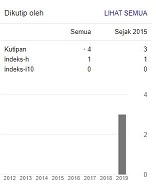THEORY OF PLANNED BEHAVIOR PADA E-COMMERCE INTENTION MAHASISWA DI SURABAYA
Abstract
Tujuan dari penelitian ini untuk menganalisis pengaruh attitude, subjective norm, perceived behavioral control dan gender terhadap e-commerce intention mahasiswa di Surabaya. Penelitian ini menggunakan sumber data primer yang diperoleh secara langsung dengan menyebarkan kuesioner kepada 103 responden. Metode pengambilan sampel adalah non-probability dengan teknik purposive sampling. Kriteria responden adalah mahasiswa yang menggunakan aplikasi e-commerce setidaknya sebulan sekali.
Metode penelitian menggunakan analisis partial least square. Temuan dari penelitian ini adalah attitude memiliki pengaruh positif terhadap e-commerce intention, subjective norm memiliki pengaruh positif terhadap e-commerce intention, perceived behavioral control memiliki pengaruh positif terhadap e-commerce intention.
Mahasiswa perempuan memiliki e-commerce intention yang lebih tinggi daripada mahasiswa laki-laki.
Keywords
Full Text:
PDFReferences
Ajzen, I. 1991. The theory of planned behavior. Organizational
Behavior and Human Decision Processes. Vol. 50(2): 179-211
Ajzen, I. 2001. Nature and Operation of Attitudes. Annual Review of
Psychology. Vol. 52: 27-58
Armitage, C. J., M. Conner, 1999. Distinguishing Perception of Control from Self-Efficacy: predicting Consumption of a Low Fat Diet using the Theory of Planned Behavior. Journal of Applied Social Psychology. Vol.
: 72-90
Armitage, C. J., M. Conner, J. Loach, D. Willets.1999. Different Perception of Control: Applying an Extended Theory of Planned Behavior to Legal and Illegal Drug Use. Basic and Applied Social Psychology. Vol. 21: 301-
Artmitage, C., M. Conner. 2001. Efficacy of the Theory of Planned
Behavior: A Meta-Analytical Review. British Journal of Social Psychology. Vol. 40: 471-499
Asosiasi Penyelenggara Jasa Internet Indonesia. 2016. Infografis
Penetrasi & Perilaku Pengguna Internet Indonesia. Survey 2016.
Asosiasi Penyelenggara Jasa Internet Indonesia. 2017. Infografis Penetrasi & Perilaku Pengguna Internet Indonesia. Survey 2017.
Badan Pusat Statistik, 2018. Berita Resmi Statistik Agustus 2018:
Tingkat Pengangguran Terbuka (TT) Sebesar 5.34 Persen. Diakses 19 Januari 2019, http://www.bps.go.id
Bandura, 1977. Self-efficacy: Toward a Unifying Theory of Behavioral
Change. Psychological Review. Vol. 84: 191-215
Bandura, A. 1993. Perceived Self- Efficacy in Cognitive Development and Functioning. Educational Psychology. Vol.28(2): 117-148
Bandura, A. 1997. Self-efficacy: The Exercise of Control. New York:
Freeman
Bandura, A. 1999. A Social Cognitive Theory of Personality. New
York: Guilford Publications
Bandura, A. 2002. Social Cognitive Theory in Cultural Context.
Journal of Applied Psychology: An International Review. Vol. 51: 269-290
Bird, B., 1988. Implementing Entrepreneurial Ideas: The Case for Intention. Academy of Management Review. Vol. 13:442-453
DaBusiness Dictionary, 2019. Attitude. Diakses 19 Januari 2019,
http://www.businessdictionary.com
Canizares, S. M. S., F. J. F. Garcia. 2010. Gender differences in
entrepreneurial attitudes. Equality, Diversity and Inclusion: An International Journal. Vol. 29(8): 766-786
Ciputra, A. Tanan, A. Waluyo. 2011. Ciputra Quantum Leap 2:
Kenapa dan Bagaimana Entrepreneurship Mengubah Masa Depan Bangsa dan Masa Depan Anda. Jakarta: Elex Media Komputindo
Chen, G., S. M. Gully, D. Eden. 2001. Validation of a New General Self-efficacy Scale. Organizational Research Method. Vol. 4(1):62-83
Dana, L., 2004. Handbook of Research on International Entrepreneurship. Cheltenham:
Edward Elgar
Davis, F. D., Bagozzi, R. P. dan Warshaw, P. R. 1989. User Acceptance of Computer Technology: A Comparison of Two Theoretical Models.
Management Science. Vol. 35(8): 982 – 1003
Dinc M. S., S. Budic, 2016. The Impact of Personal Attitude, Subjective
Norm and Perceived Behavioral Control on Entrepreneurial
Intentions of Women. Eurasian Journal of Business and Economics. Vol. 9(17): 23-35
Eagly, A. H., S. Chaiken. 1993. The Psychology of Attitudes.
Orlando: Harcourt Brace Jovanovich College Publishers
Ekayanti, Y. 2016. E-Commerce Industry One Step Ahead: How to get
sales leads. Diakses tanggal 19 Januari 2019, https://adways.co.id/blog/ecommerce- industry-one-stepahead-
how-to-get-sales-leads Engle, R. L., C. Schlaegel, S. Delanoe,
The Role of Socia Influence, Culture and Gender on Entrepreneurial Intent. Journal of Small Business and Entrepreneurship. Vol. 24(4):
-492
Fishbein, M., I. Ajzen. 1975. Belief, Attitude, Intention and Behavior:
An Introduction to Theory and Research. New York: Addison-Wesley
Hair, J. F., G. T. M. Hult, C. M. Ringle, M.Sarstedt. 2014. A Primer on
Partial Least Squares Structural Equation Modeling (PLS-SEM). California: SAGE Publications, Inc.
Ham, M., M. Jeger, A. F. Ivković. 2015. The Role of Subjective Norm in
Forming the Intention to Purchase Green Food. Economic Research. Vol. 28(1):738-748
Hatak, I., R. Harms, M. Fink. 2015. Age, job identification, and entrepreneurial intention. Journal of Management
Psychology. Vol. 30(1): 38-53 Haus, I., R. Isidor, H, Steinmetz, R.
Kabst. 2013. Gender Effects on Entrepreneurial Intention: A Meta-Analytical Structural Equation Model. International Journal of Gender and
Entrepreneurship. Vol. 5(2):130-156
Hsu, D. K., K. Burmeister-Lamp, S. A. Simmons, M-D. Foo, M. C.
Hong, J. D. Pipes. 2018. “I know I can, but I don’t fit”: Perceived fit, self-efficacy, and entrepreneurial intention. Journal of Business Venturing. Vol. 34(2): 311-326
Hsu, M., C. Yen, C. Chiu, C. Chang. 2006. A Longitudinal Investigation of Continued Online Shopping Behavior: An Extension of the Theory of
Planned Behavior. International Journal of Human-Computer Studies. Vol. 64: 889-904
Kakkonen, M-L. 2018. First-year business students’ entrepreneurial attitudes. 4th International Conference on Higher Education Advances.
-265
Katz, J., W.B. Gartner. 1988. Properties of Emerging Organizations.
Academy of Management
Review. Vol. 13(3): 429-441
Kickul, J., F. Wilson, D. Marlino, S. D.
Barbosa. 2008. Are Misalignment of Perceptions and Self-efficacy Causing
Gender Gaps in Entrepreneurial Intentions among Our Nation’s
Teen. Journal of Small Business and Enterprise Development.
Vol. 15(2): 321-335
Krueger, N. F., M. Reilly, A. Carsrud. 2000. Competing Models of Entrepreneurial Intentions.
Journal of Business Venturing.Vol. 15(2): 411-432
Kulas, J. T. 2008. SPSS Essentials: Managing and Analyzing Social
Sciences Data. New Jersey: John Wiley & Sons
Linán, F., Y. W. Chen. 2009. Development and Cross-Cultural Application of a Specific Instrument to Measure Entrepreneurial Intentions. Entrepreneurship Theory and Practice. Vol. 24(3): 5-24
Lo, C., K. Law. 2012. Comparing the Entrepreneurial Intention
between Female and Male Engineering Students. Journal of Women’s Entrepreneurship and Education. Vol. 1(2): 28-51
Mat, S. C., S. M. Maat, N. Mohd. 2015. Identifying Factors that Affecting
the Entrepreneurial Intention among Engineering Technology Students. Procedia – Social and Behavioral Science. Vol (211): 1016-1022
Mueller, S. L. 2004. Gender Gaps in Potential for Entrepreneurship
Across Countries and Cultures. Journal of Developmental Entrepreneurship. Vol. 9(3):199-220
Mueller, S. L., M. C. Dato-On. 2008. Gender-role Orientation as a
Determinant of Entrepreneurial Self-efficacy. Journal of Developmental
Entrepreneurship. Vol. 13(1): 3-20
Robledo, J. L., M. V. Aran, V. M. Sanchez, M. A. R. Molina. 2015.
The moderating role of gender on entrepreneurial intententions:
A TPB perspective. Intangible Capital. Vol. 11(1): 92-118
Romer, P. 1994. The Origins of Endogenous Growth. Journal of
Economics Perspective. Vol. 8(1): 3-22
Santos, F. J., M. A. Roomi, F. Linan. 2014. About Gender Differences
and the Social Environment in the Development of Entrepreneurial Intentions. Journal of Small Business Management. Vol. 54: 49-66
Shook, C. L., C. Bratianu. 2010. Entrepreneurial intent in a transitional economy: an application of the theory of planned behavior to Romanian
students. International Entrepreneurship and Management Journal. Vol 6(3): 231–247
Sweida, G. L., R. J. Reichard. Gender stereotyping effects on entrepreneurial self-efficacy and high-growth entrepreneurial
intention. Journal of Small Business and Enterprise Development. Vol. 20(2): 296-313
Tsang, K. K. 2012. The Use of Midpoint on Likert Scale: The Implication
for Educational Research. Hong Kong Teachers’ Centre Journal. Vol. 11: 121-130
Van Auken, H., F. Fry, P. Stephens. 2006. The Influence of Role Models on Entrepreneurial Intentions. Journal of Developmental Entrepreneurship. Vol. 11(2):157-167
Yordanova, D. I., M-A. Tarrazon. 2010. Gender Differences in Entrepreneurial Intentions: Evidence from Bulgaria. Journal of Developmental Entrepreneurship. Vol. 15(3): 2
DOI: http://dx.doi.org/10.53712/jmm.v4i2.655
Refbacks
- There are currently no refbacks.
Indexing:
Aliansi:
Reference Manager:
View Statistic
Published by Prodi Manajemen Fakultas Ekonomi Universitas Madura
Jl. Raya Panglegur Km 3,5 Pamekasan
Phone: (0324) 322231
website: http://ejournal.unira.ac.id/index.php/jurnal_makro_manajemen/index
Email: makro@unira.ac.id
MAKRO by Universitas Madura is licensed under a Creative Commons Attribution 4.0 International License.







